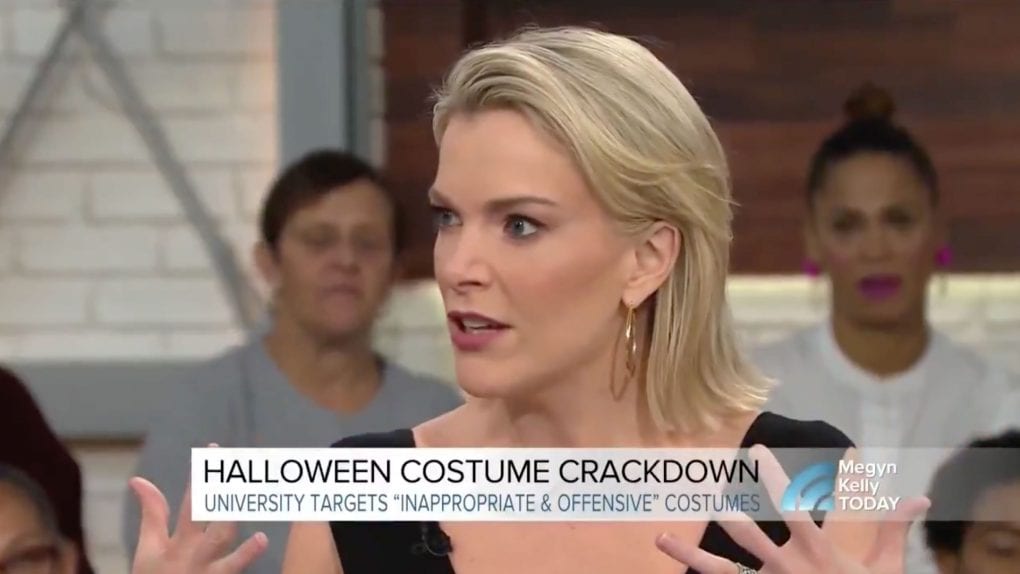by Kim Joseph and Ashley Anderson
October is here, and the leaves are changing. Thankfully, there is no shortage of Halloween decorations, horror films, and pumpkin spice lattes to get us into the fall spirit. But while the leaves are changing, sometimes it feels like the times have not changed much at all. Every year, it seems a few of us need reminding of what is festive and what is flat-out racist.
Blackface is back, and so is the racially charged discussion surrounding its use. On October 23rd, in a roundtable segment on “Megyn Kelly TODAY” that focused on Halloween costumes, host Megyn Kelly asked her panelists “what is racist” about white people wearing blackface during Halloween. She went on to say that it was OK when she was younger “as long you were dressing up as a character.” She continued by defending another celebrity who had recently darkened her skin for a Diana Ross costume. “If she wants to look like Diana Ross for one day, I don’t know how that got racist for Halloween,” Kelly said. “It’s not like she’s walking around in general.”
People have been using blackface to get into ‘character’ for a while now. Blackface got its start in American culture in ‘minstrel shows.’ They began around 1830 and remained vastly popular for the better part of a century. In these shows, white actors would paint black grease on their faces to mock plantation slaves and free people of color. On stage they were always teasing, contemptuous portrayals that dehumanized African-Americans and depicted them as inferior, criminal, and lazy.
Just as systematic oppression didn’t go anywhere when slavery was abolished, Jim Crow and characterizations like Mammy and Uncle Tom didn’t go away when minstrel shows did. Blackface and its tropes later showed up on Broadway, in films in the 20th century and beyond (here’s looking at you, Tropic Thunder), and in commodities in the 20th century. Now, it shows up on Halloween.
Especially ill timed are Kelly’s comments about blackface because racial tensions are extremely high in America. Just this past weekend, “The Hate U Give,” a movie inspired by recent cases of police brutality against black people and the Black Lives Matter movement, was released in theaters. Last month marked the one-year anniversary of the Charlottesville tragedy, which involved violence between white nationalists and counter protestors. Anti-racist counter protestor Heather Heyer was killed when a white nationalist drove through a crowd.
Black people are not the only popular costume choice. Many costume shops still offer “sexy geisha” and “sexy native princess” costumes, despite their contributions to the exoticization of East Asian women and the oversexualization of Native women. This is especially disturbing considering Native women experience the highest rate of rape and sexual assault. Dressing up as gang members while appropriating cholo/a culture is certainly not helpful when the American president and his government are implementing racially-charged immigration policies.
To answer Megyn Kelly’s original question, everything about wearing blackface or any other type of “-face” for Halloween is racist. Someone’s racial identity is not your costume. Much like it did in the nineteenth century, today blackface reinforces a harmful notion that black people are appropriate targets for mockery and stereotyping. And that mockery and stereotyping leads to continued racism and violence. Blackface is not just a part of a longer narrative of oppression. It is itself oppressive. So this Halloween, know that in order to be dressed as a character or celebrity of another race, you don’t need to darken your skin. As for those caricatures? Just walk away from them.
Kim Joseph and Ashley Anderson are students in English 291: What Is Racial Difference?

